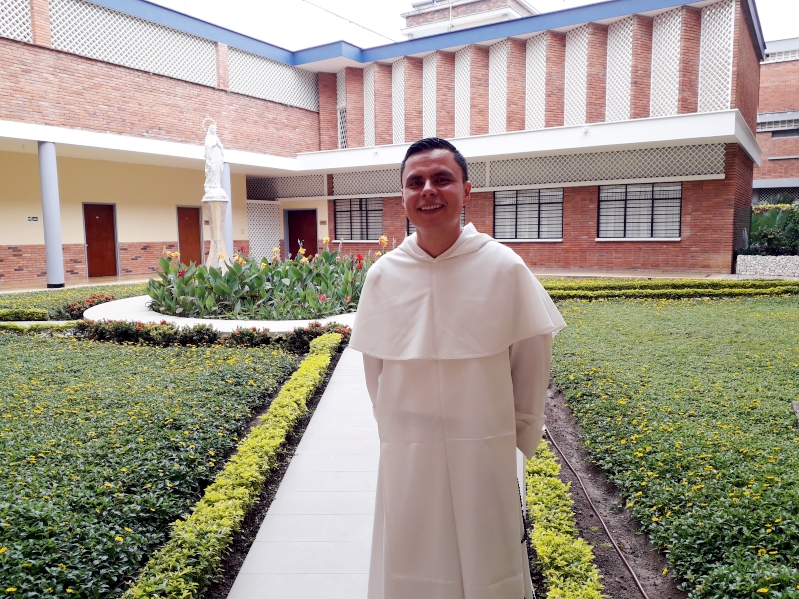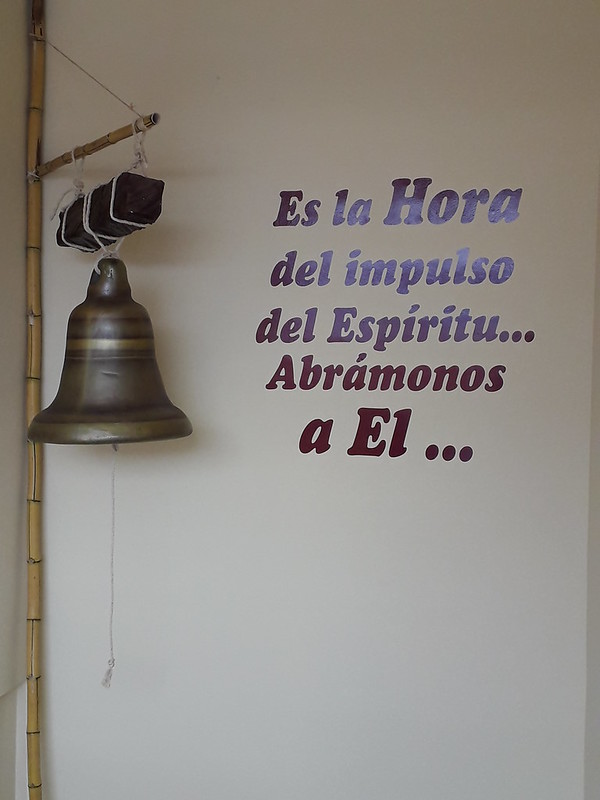Homily for the Eucharist of July 23, 2019
La Turena, Bucaramanga (Colombie), 23/07/2019.- According with our particular right, the election of the Superior General must be preceded by some days of spiritual retreat. Because of that from July 23 to 25 we are in some days of silence and prayer.

We are accompanied by Fray Franklin Buitrago Rojas OP, who is the Master Father of the student friars and Dean of the Faculty of Theology at the Santo Tomas de Aquino University in Bogotá. We will share the homilies of the Eucharistic celebration of these days.
Something that is normal for us, but that is curious about religious life for people who come from outside is the fact that we call each other "brother" or "sister", "father" or "mother": Sister Marta , Fray Pedro, Sr. Margarita, Father Juan, Mother Teresa. Sometimes, people believe that it is a title, something like "doctor" or "lady." Sometimes, sadly, we ourselves believe it too. And, it is easier when accompanied by other titles: "principal sister", "director sister", "father teacher". The gospel of this day comes to remind us what it means in its most genuine sense that name of "sister" or "brother" that we carry: those who follow Christ form a new family, beyond the ties of blood, family, nationality or ideology I think that an assembly like this one, with women from so many countries, from so many places, from so many different stories, but who can call each other “sisters,” is a wonderful testimony of how this word of the Lord comes true in our midst.
At the same time, the Gospel is realistic: the brotherhood that exists between us cannot depend solely on our personal sympathies, our alliances or common interests. All this does not go very far and the history of the peoples has demonstrated it. The foundation of our brotherhood is in two things: to recognize that we are all sons and daughters of the same Father, of the same creator, who has called us into existence in this common house. Today more than ever we discover the interdependence that exists among all the inhabitants of the earth, the need we have of all for the survival of humanity. But, the Lord adds a second element: "He who fulfills the will of my Father, that one is my brother and sister, and my mother." It is not enough just to be children of the same father: it is necessary to assume it, live it, make it happen. We would say, in our case: it is not enough to bear the name of sister, brother, fray, father or mother: it is necessary to assume it, live it, make it happen. When that name becomes a title, it only moves away from people, fill us with pride, protect us and put us on a pedestal. We know that the Lord wants the opposite: that we become brothers and sisters of every human being, which we become neighbors abroad: that is the concrete way in which we live the will of our Father, how we make charity come true.
The first reading, taken from the book of Exodus, presented us with one of the central passages of the Old Testament that has been recreated so many times in Hollywood films: the passage of the Red Sea. It is the decisive moment of Yahweh's victory over the tyranny of Pharaoh, it is the event that marks the transition from slavery to freedom. Exegetes and archaeologists have long argued about the historicity of this fact; about the documentary evidence that could remain in the monuments and papyri of ancient Egypt. In the midst of so many theories, a fact appears in which I want to insist: although the biblical account shows that all these freed slaves were descendants of the same family, of twelve tribes dating back to a common ancestor, it is very possible that the group led by Moses other slaves and prisoners from different places came together. Slaves living in Egypt were prisoners of war bought in different places in Africa, the Middle East and the Mediterranean. However, thanks to faith in one God, thanks to the experience of the Exodus, those slaves who had lost their homeland ended up forming a new people guided by faith in Yahweh.
We have then in the Old Testament a precedent of what Christ proposes to us: to gather men and women from different backgrounds to form a people, a family, gathered by faith in one God, Father of all. We also know that the passage of the Red Sea, with all the importance and spectacularity of the story, is only the beginning of a long road through the desert. This group of men and women will have to go through many experiences before actually recognizing children of God and brothers among themselves. Something similar happened with the disciples of Jesus: the experience of the cross and the resurrection, the sending of the Holy Spirit, the missions and the debates of St. Paul were necessary for the Samaritans, the Gentiles and the pagans to be fully accepted in the Church. In one of his books, the Dominican theologian Edward Schillebeeckx says that Jesus does not found an institution, but rather begins a movement: Jesus brings together men and women to walk together guided by faith towards full freedom. Throughout history, many more have joined that movement that the Lord began. We, you and me, we are part of that great movement initiated in Galilea. It was two thousand years ago. An assembly like this, a general chapter of an international congregation, is a wonderful testimony that this call to live as brothers and sisters is possible, that Kingdom of God is real despite so many conflicting differences, disagreements and interests between our villages.
May the Spirit of the Lord assist us, especially these days, so that we may be witness to the true unanimity that is born only of Charity. Amen.
Comments
- No comments found





Leave your comments
Login to post a comment
Post comment as a guest